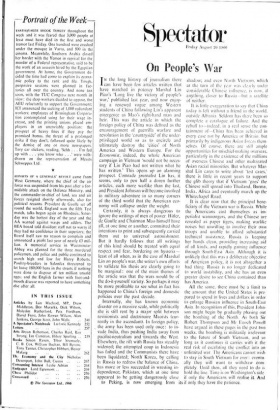On People's War
N the long history of journalism there -Lean have been few articles written that have matched in potency Marshal Lin Piao's 'Long live the victory of people's war,' published last year, and now enjoy- ing a renewed vogue among Western students of China following Lin's apparent emergence as Mao's right-hand man and heir. This was the article in which the foreign policy of China was defined as the encouragement of guerrilla warfare and revolution in the 'countryside' of the under- privileged world so as to encircle and ultimately destroy the 'cities' of North America and Western Europe. For the Economist, indeed, the whole American campaign in Vietnam 'would not be neces- sary if Lin Piao had not written what he has written.' This opens up an alarming prospect. Comrade journalist Lin has, it seems, only to pen half a dozen further articles, each more warlike than the last. and President Johnson will become involved in military adventure in so many corners of the third world that the American eco- nomy will collapse under the weight.
Certainly, it is always dangerous to ignore the writings of men of power. Hitler, de Gaulle and Chairman Mao himself have all, at one time or another, committed their intentions to print and subsequently carried them out to universal astonishment. But it hardly follows that all writings of this kind should be treated with equal respect and fear, bordering on hysteria— least of all when, as in the case of Marshal Lin on people's war, the writer's own efforts to validate his thesis are clearly going to be marginal: one of the main themes of the article was that the wars would be of the do-it-yourself variety. So perhaps it may be more profitable to see what in fact has happened to China's foreign and domestic policies over the past decade.
Internally, she has known economic disaster on a massive scale, while politically she is still rent by a major split between revisionists and doctrinaire Maoists (cur- rently in the ascendant). In foreign policy, the army has been used only once: to in- vade India, thus pushing India away from pacifist-neutralism and-towards. the West.
Elsewhere, the rift with Russia has steadily widened; the attempted coup in Indonesia has failed and the Communists there have been liquidated; North- Korea, by calling in Russia to redress the balance of China. has more or less succeeded in wresting in- dependence; Pakistan, which at one time appeared to be getting dangerously close to Peking, is now emerging from its
•
shadow; and even North Vietnam. which at the turn of the yc:tr was clearly under considerable Chinese influence, is now, if anything, closer to Russia—but a satellite of neither.
It is little exaggeration to say that China today is left without a friend in the world. outside Albania. Seldom has there been so complete a catalogue of failure. And the rebuff to—indeed. in a real sense the con- tainment of—China has been achieved in every case not by America or Britain, but primarily by indigenous Asian forces them- selves. Of course, there are still ample opportunities for mischief-making overseas, particularly in the existence of the millions of overseas Chinese and other maltreated Asian racial minorities. But whatever Mar- shal Lin cares to write about 'test cases,' there is little in recent years to support the glib theory that if Vietnam 'goes' the Chinese will spread into Thailand, Burma. India, Africa and eventually march up the Whitechapel Road.
It is clear now that the principal bene- ficiary of the Vietnam war is Russia. While the Americans cast themselves as im- perialist warmongers. and the Chinese are revealed as paper tigers. making warlike noises but unwilling to involve their own troops and unable to afford substantial technical assistance. Russia is keeping her hands clean, providing increasing aid of all kinds, and rapidly gaining influence through South-East Asia. Although it is unlikely that this was a deliberate objective of American policy, it is not altogether a bad thing. Russia is no longer dedicated to world instability, and she has an even greater desire to see China contained than has America.
All the same, there must be a limit to the amount that the United States is pre- pared to spend in lives and dollars in order to enlarge Russian influence in South-East Asia. In recognition of this. President John- son might begin by gradually phasing out the bombing of the North. As both Sir Robert Thompson and Mr Enoch Powell have argued in these pages in the past two weeks, the bombing is militarily irrelevant to the future of South Vietnam. and so long as it continues it carries with it the real risk of escalating the conflict into an unlimited war. The Americans cannot wish to stay in South Vietnam for ever: eventu- ally they will want to withdraw com- pletely. Until then, all they need to do is hold the line. Time is on Washington's side if only the Americans will realise it. And if only they have the patience.






























 Previous page
Previous page